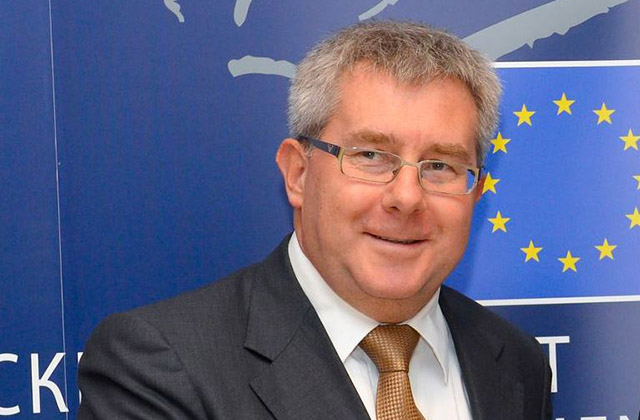“Election fraud may lead to various consequences in Armenia-EU relations”

Interview with Richard Charnetsky, deputy president of the EuroNest Parliamentary Assembly, European political figure.
Within the working visit paid by Serzh Sargsyan, President of Armenia, to Brussels on February 26-28 it was announced on finalization of Armenia-EU negotiations, three years later from failure of the Association Agreement (AA) with the European Union (EU). How do you assess the current stage of Armenia-EU relations? What has changed after 2013 crisis?
The most obvious change is the scope of the two agreements. The new one will only encompass political part of the previous one and very limited section on trade, as DCFTA (Deep and Comprehensive Free Trade Area) is not compatible with Armenia’s participation in EAEU (Eurasian Economic Union). However, having a new agreement on the part which still requires a lot of good will and reforms from the Armenian authorities is a very good sign and shows that mutual relations are getting better and closer.
Doesn’t the EU have such worries that Sargsyan’s visit to Brussels and his rich agenda may be considered as support from Brussels to Sargsyan’s team during the upcoming parliamentary elections in Yerevan?
Mr. Sargsyan is a democratically elected President of Armenia and in the course of his tenure he made many visits to Brussels. This one was important, as a new framework document with the EU is at the final stage and I think it should be seen as a credit to the current authorities that it has been done before the elections – and such crucial ones, as after April 2017 a new political system will be in place in the country. Rich agenda and many meetings should in no way be seen as a political support by the EU, it is just business as usual. The negotiating team did a very good job and managed to finalize the deal and both sides met to discuss it.
We know that the new framework agreement is different from Armenia-EU Association agreement. To your mind, what will this new agreement be able to give to Armenia in political and economic fields?
It won’t give a lot in economic field, as – and I it mentioned before – EAEU takes precedence in this area. However, it contains provisions regarding the rule of law, democratic oversight, civil society and many other aspects of functioning of the democratic country, which I hope will help Armenia and Armenians to get even closer to the standards set in the EU. Perhaps in time it could also mean returning to negotiations on closer economic ties, even though I perfectly understand the current international and geopolitical situation of the country and why EAEU was chosen over the EU. Still, finalising the new agreement shows that Armenian European ambitions are and always have been on the agenda.
Parliamentary elections will be held in Armenia in a month. In partnership with the UNDP and the United States, the European Union has responded positively to the government’s request for assistance in funding implementation of this electoral reform package. EU financial support of up to €7 million will close the identified financial gap and, thus, will allow for the smooth implementation of the electoral reform agreement. But many experts in Armenia insist that the election fraud has again to do with the ruling party. The Head of the EU Delegation says that proper, transparent elections will open new doors for Armenia-EU cooperation. What should we anticipate from Armenia-EU relations if the observers register election fraud during upcoming elections?
It definitely won’t help the relations and may lead to various consequences, including limiting Armenia’s participation in EU programmes, for instance. However, I do not believe it will come to this. I have observed the elections in Armenia before and – although not perfect – they were conducted in an orderly and overall good manner, and I do hope that the upcoming ones will set the standards even higher. It is an especially important moment for the country, with new constitutional arrangements kicking in after the new parliament is formed. I will be in Yerevan during the elections as part of the EP short term monitoring mission.
After Armenian election when can the new framework agreement between Armenia and the EU be signed? Which factors depend on these issues?
This is a question for the EEAS rather than for an MEP, as even we do not get all the technical details. I believe that the ball will be more in the court of the new government, but it seems likely that whoever wins the elections will want to ratify the new agreement.
By Araks Martirosyan

























